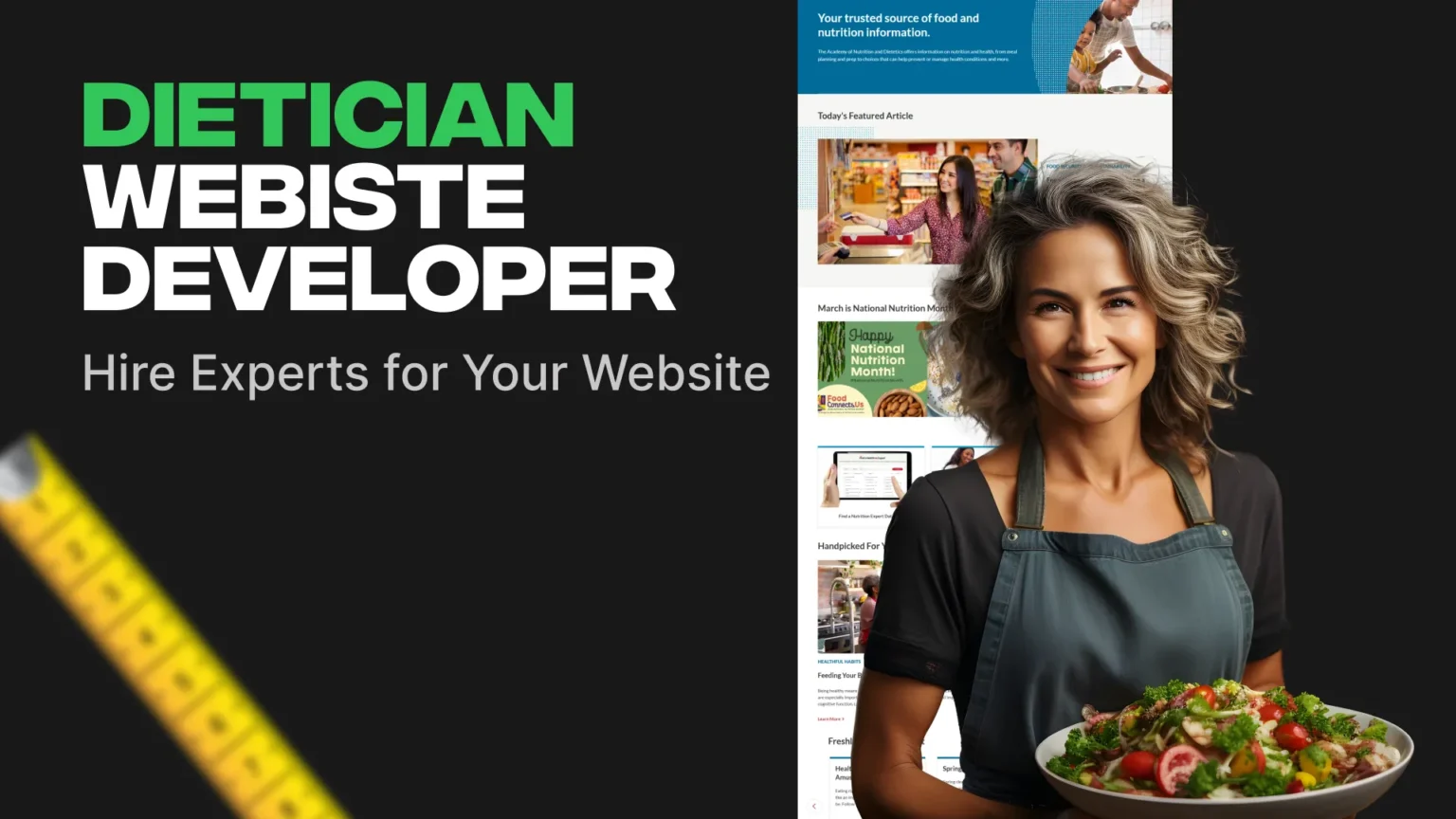The year 2026 will require dietitians to maintain professional websites due to modern market demands. The research demonstrates that 70% of patients conduct health professional online inquiries before scheduling appointments and website access remains vital for 63% of dietitians in attracting new clients. Most nutrition experts continue to focus only on social media platforms as they fail to recognize the strategic advantages of a website for professional growth. A website enhances reputation through professionalism while simultaneously bringing in high-quality leads because users can purchase passive income products such as meal plans, e-books, and virtual consultation services. A website’s SEO optimization leads to better search rankings because 93% of online searches begin with search engines and helps dietitians expand their client base.
This guide investigates why weight loss practitioners need websites that demonstrate both essential capabilities and creation procedures for developing successful online platforms. The guide will explain how dietitians at any level can utilize a website to increase business reach while improving client relationships and achieving effective growth. A refined digital presence roadmap will help you become distinctive in the health and wellness industry through our guidance by the concluding stage of this guide.
Why a Dietitian Needs a Professionally Designed Website
A professionally designed website serves as vital in the competitive health and wellness industry for dietitians who want to gain client attention. A professional website serves greater purposes than portfolio management because it establishes credibility while improving client interactions and generating increased revenue.
Credibility & Trust
Immediately after reviewing a website design, one experiences enhanced trust and professionalism. Research indicates that website design serves as the foundation for consumer judgments about a business’s credibility since 75% of consumers make their decisions based on design. The addition of client testimonials along with certifications and success stories in a specific section of the website serves to build expert competence which encourages prospects to schedule services.
Appointment Booking System
A website that includes appointment booking features automatically schedules consultations without requiring additional hand-to-hand communication. An integrated appointment booking system through a website provides automated reminders which allow dietitians to dedicate more time to their practice instead of administrative activities.
E-commerce Features
A website developer who specializes in dietetics will implement e-commerce functionalities to sell customized nutrition materials including individualized plans and virtual consultation bundles to clients. Through e-commerce integration, dietitians can generate additional money flows which provide their clients with supplemental services beyond conventional in-person consultations.
Content Marketing & SEO
Dietitians can attract natural website visitors through search engine optimization of their site because 93% of online journeys start with an online search. The practice of blogging together with recipe distribution and providing nutritional information, helps websites achieve better search rankings that attracts active clients who need professional advice.
Lead Generation & Client Engagement
The implementation of lead capture tools consisting of newsletters and contact forms as well as helpful free resources helps website visitors become paying clients. A dietitian’s email marketing efforts alongside valuable content help to establish enduring client relationships which results in practice expansion.
Key Features of a High-Performing Dietitian Website
Modern websites run by dietitians perform as business resources that simultaneously draw prospective clients while improving brand reputation and creating financial success. Health and wellness sector competition requires dietitians to develop websites which include vital attributes for enhancing user experience and search engine placement while controlling client communication.
User-Friendly Design & Mobile Responsiveness
Being able to navigate websites on all screen sizes represents a key factor since mobile devices generate more than 60% of web traffic. A website design structure which responds seamlessly enables visitors to easily use the platform to access services, view content, and book consultations, thereby driving better user engagement and conversions.
SEO Optimization – Ranking for Dietitian-Related Searches
The search engine optimization of websites enables dietitians to obtain higher positions in search results thus enabling better discovery by prospective clients. Cyrus the dietitian website developer can execute keyword-focused strategies and optimize site speeds while developing effective content organization to drive organic traffic and expand client numbers.
Appointment Scheduling Integration
Clients benefit from easy consultation scheduling when a website includes appointment booking solutions such as Calendly, Acuity or custom/regional options. Through automated reminders together with calendar synchronization system both no-shows and administrative tasks decrease which leads to increased efficiency.
E-commerce Capabilities
Health professionals who operate websites through built-in e-commerce capabilities can market digital meal plans together with nutrition guides and membership subscriptions to their clients. The supplementary money source enables the organization to broaden its professional capabilities by offering additional services past individual appointments.
Client Testimonials & Success Stories – Building Trust
Successful clients who leave positive feedback play a major role in helping others make their decisions. The display of testimonials on a website helps to established credibility and creates trust with potential clients while enhancing the dietitian’s position as an expert in wellness industry.
Dietitians can establish websites which capture visitors and turn them into dedicated customers through the incorporation of these essential properties.
How to Choose the Right Dietitian Website Developer
The selection of an appropriate dietitian website developer determines the quality and performance capabilities of your website to acquire and maintain a client base. The creation of an outstanding dietitian website demands that it must work fluently, in addition to maintaining an attractive appearance, with features for appointment scheduling, together with SEO optimization and e-commerce functions.
When searching for a developer, you should focus on acquiring particular competencies.
Web designers who work on dietitian sites need to demonstrate experience with web design and SEO optimization as well as mobile optimization along with user-friendly navigation. The developer needs to grasp the special requirements of dietitian websites which integrate content organization combined with lead capture instruments.
An experienced developer should demonstrate their background in working with healthcare and wellness websites.
A developer who works on dietitian websites should demonstrate knowledge about HIPAA requirements as well as secure data practices and the most effective methods for building trust in nutrition-related sites.
Businesses should determine which website solution, between custom development or template usage, offers the better results.
The cost of custom websites includes total flexibility, customized branding, and advanced features. Template-based websites deliver faster launch times while costing less yet their unique characteristics become scarce. Business selection of website design stems from budget constraints and organizational objectives.
Take time to evaluate the developer by checking their previous work, together with client feedback and online feedback before making a hiring decision. The presentation of a dietitian or wellness websites in a portfolio demonstrates both reliability and expertise of the developer.
Best Platforms & Technologies for Dietitian Websites
The functional quality along with administrative control and future development expansion of a dietitian website depends heavily on the selection of its platform technology. The following technologies are the best choices depending on your requirement between a basic portfolio and a complete e-commerce solution:
WordPress (Elementor/Divi) – Best for Flexibility and SEO
WordPress commands over 40% of the web platform yet it remains popular among dietitians because of its adjustable features along with SEO optimization. Through toolkits such as Elementor and Divi, dietitians gain the ability to design website pages that look great and remain personalized with no need for coding knowledge. Your website can boost its dietitian-related search rankings through the implementation of powerful SEO plugins that WordPress offers.
Shopify & WooCommerce – Ideal for selling meal plans & supplements
Authentic dietitians who want to establish digital sales for their meal plans and e-books or supplements should opt for the Shopify platform combined with WooCommerce (based on WordPress). Shopify delivers whole-platform ease of setup but WooCommerce lets users customize SEO factors completely.
Wix & Squarespace – Great for Beginners and Simple Setups
A professional website with basic features can be built using Wix and Squarespace because they both offer simple drag-and-drop editing capabilities to beginners. The platforms serve dietitians who need a speedy yet simple website solution which demands minimal upkeep.
Custom Development (React, Next.js, Node.js) – For High-Performance Sites
A customized website with maximum speed and security exists exclusively through the combination of React, Next.js, and Node.js. Businesses with extensive needs along with advanced requirements such as AI-run meal planning and client portal access should opt for this option.
Your business requirements and financial capacity alongside system prerequisites will determine which platform selection you should make.
Cost of Hiring a Dietitian Website Developer
To develop both credibility and business expansion, a dietitian should invest in working with a website developer. Your developer hire price will depend upon how customized you need your site to be, along with the features you select between a freelancer or an agency.
Freelancer vs. Web Development Agency – Pros & Cons
Freelancer: More affordable, flexible, and ideal for smaller projects. The quality of services and available support levels may differ.
Web Development Agency: Offers a professional team with expertise in design, SEO, and development. High quality results along with ongoing support from agencies come with increased costs for their services.
Average Pricing Breakdown
Basic Website ($500 – $2,000)
- A suitable solution for medical professionals looking to present basic contact information through simple portfolios.
- Such websites incorporate a homepage together with service pages and a blog section.
Custom Website with Booking System ($2,000 – $5,000)
- The package provides scheduling software (Calendly and Acuity) together with tools for lead gathering.
- The platform comes with search engine optimization features together with mobile-friendly capabilities.
Advanced E-Commerce Website ($5,000+)
- E-books together with meal plans and nutritional subscription services make their best matches on this platform.
- You can find payment security and customized brand options as well as rapid server hosting among this system’s features.
Business decisions about options must balance between your financial capacity and professional requirements.
Step-by-Step Process to Hire a Dietitian Website Developer
Hiring the correct dietitian website developer leads to building a website that improves credibility and client attraction and drives business expansion. The following guide shows you how to locate the ideal developer who will fulfill your requirements.
Step 1: Define your website goals & must-have features
Your main website objectives must be stated before beginning your search for a developer. You require one of three things: a straightforward portfolio or appointment scheduling system, or an online e-commerce platform for meal plan sales. Your requirements need definition to select a developer with appropriate expertise.
Step 2: Research and Shortlist Developers
Your developer search should focus on professionals who have worked with healthcare and wellness websites. The development of dietitian websites requires professionals who maintain expertise in this field, and you should search for them through Upwork as well as Fiverr and agency websites.
Step 3: Request proposals and compare pricing
Contact developers who passed your criteria to receive detailed proposals which detail both pricing and project timelines together with a list of included features. Select the price options from various providers that match your financial plan alongside your necessary features.
Step 4: Check their portfolio & testimonials
The assessment of previous projects should focus on design approaches together with implemented features and received client feedback. Expertise is reflected by having an outstanding portfolio that contains dietitian or wellness website projects.
Step 5: Discuss SEO, security, and future maintenance
The developer needs instructions about implementing SEO best practices for better website rankings. Inquire about security protocols and establish if they provide continuous updates and technical service maintenance.
Step 6: Sign a contract and start the project
After selecting your developer, you should formalize the agreement, which includes defining the project specifications together with time requirements and payment arrangements. The finalized contract ensures the development process’s success and a successful website launch.

Conclusion
An expertly crafted dietitian website functions as an influential business tool which enhances your professional image while bringing in new clients to assist your practice development. The correct website with features for search engine optimization along with appointment booking functionality and e-commerce features provides you an edge against competitors in the wellness sector. Consider Infowind Technologies’ healthcare services to find developers who specialize in healthcare web solutions.
During the hiring process, look for dietitian website developers with healthcare website experience and solid knowledge of SEO combined with positive client feedback. The development of websites focused on e-commerce operations, which includes meal plans and supplement sales, demands a Shopify development company. The Node.js and React.js technologies provide scalability and speed for high-performance custom-built websites, and users can discover additional information about Node.js development and React.js services.
Next Steps to Get Started
- Identify your website objectives together with essential features that it should contain.
- Research and shortlist experienced developers.
- In this step, potential clients should make requests for proposals followed by comparing price offers and inspecting professional work examples.
- The website project can start through finalizing the contract.
A high-quality website represents one of the smartest financial choices to enhance your dietitian practice. Launch today to build a robust online presence which naturally acquires and maintains your target clients.





